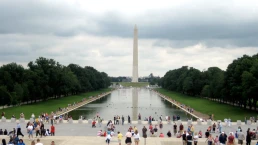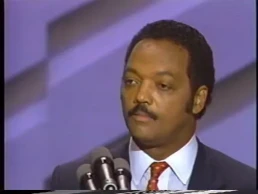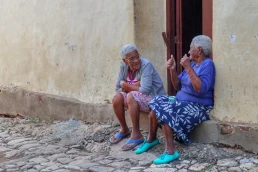Democrats could have protected DC by granting statehood when they had the chance.
By Sam Rosenthal
On Monday, August 11th, Donald Trump’s authoritarian gaze landed on Washington, DC, the city of 700,000 people in the White House’s backyard. In a move of extreme overreach, he announced that he would be invoking Section 740 of the Home Rule Act, which gives the president the ability to command DC’s Metropolitan Police Department for “federal purposes.” Trump claimed, despite much evidence to the contrary, that DC was in the midst of a crippling crime wave that necessitated a federal response. That Trump’s power grab is legally dubious and almost certainly outside the ambit of what the authors of the Home Rule Act had in mind is beside the point. Because of its lack of statehood, DC has been a sitting target for the right wing for decades.
DC statehood is often framed as a daunting, pie-in-the-sky goal, but making DC a state would only be as hard as getting a bill passed through Congress. DC could be granted statehood by an act of Congress, signed into law by the president, and immediately be given the rights to self-government which residents of all 50 states currently enjoy.
A bill granting DC statehood, HR 51, has already been introduced in this session by DC Congresswoman Eleanor Holmes Norton. ( A companion Senate bill has been introduced by Maryland Senator Chris Van Hollen.) In fact, bills granting DC statehood have been introduced consistently since 2017. In 2020, in the wake of the Black Lives Matter uprisings in DC and Trump’s deployment of the National Guard against protestors, the House of Representatives passed an act admitting DC as the 51st state. This bill, however, died in the Republican controlled Senate.

These efforts have been largely ceremonial. Congressional Democrats should be well aware that these bills stand no chance of passing a Republican-controlled Senate chamber, nor is there any way such legislation would avoid a veto by a Republican president. The reason is simple: if granted the full benefits of statehood, DC would immediately become the bluest state in the country. (DC’s percentage of registered Democrats, 75%, is more than 20 points ahead of the next-bluest state by registration, Maryland.) That would mean two more reliably Democratic senators, and at least one more Democrat in the House.
Instead of jumping at the opportunity to consolidate this advantage, however, Democrats have been gun shy at the prospect of pushing in earnest for DC statehood when the right conditions have arisen. In the first few months of Barack Obama’s first term in office Democrats held a filibuster-proof majority. This era is remembered largely for being the window that Obama and Democrats used to pass the Affordable Care Act. Democrats could have also used this moment to push through a DC statehood bill; no such legislation was introduced by the majority party in either chamber of Congress.
More recently, Democrats held control of both the House and Senate during the first half of Joe Biden’s term as president. Rep. Holmes Norton also introduced a statehood bill during that session of Congress, which passed the House along a largely party-line vote. However, the bill was not taken up in the Senate, despite Democrats’ control of that body. This had largely to do with then-Senators Joe Manchin and Kyrsten Sinema’s pivotal positions in determining what legislation had a chance at passage in the Senate. Manchin declared that he did not support the statehood bill while Sinema’s support was unclear. This effectively killed the legislation, which would have also required Democrats to make the politically risky move of scrapping the filibuster to realize DC statehood.
With inconstant support from Democrats in Congress, the statehood movement has stalled out again. While Democrats profess support for DC statehood, they have done little to prioritize it in practice. Their 2024 platform makes a single mention of the party’s support for statehood, and pins the responsibility entirely on Republicans for blocking statehood votes when, in reality, intransigence within the Democratic ranks shares equal blame in recent history.
If the shoe were on the other foot, it is hard to imagine the current Republican Party feeling any compunction about forcing through the establishment of a 51st state that would guarantee two more Republican seats in the Senate. As in so many arenas of American politics today, the Democrats’ inability or unwillingness to seize more power when the opportunity presents itself has led to disastrous downstream effects.
Now, DC’s residents are entirely exposed to Trump’s capricious and volatile brand of politicking. He has vowed to clear encampments of the unhoused, arrest children, and target the undocumented using the full force of the Metropolitan Police Department and the National Guard. He has encouraged police to brutalize citizens if they wish, and raised the specter of calling active duty military into the city. These actions are clearly designed to create a spectacle and shore up his strongman image, at the expense of 700,000 people who are American citizens without political recourse or representation.
Whatever happens in the coming days and weeks, it is important to remember that DC residents don’t have to live like this. The Democratic Party should put DC statehood at the front of its political platform, in 2028 and beyond, and ensure that no wannabe despot can ever use the city as his punching bag again.
Recent Posts
U.S. Sent a Rescue Plane For Boat Strike Survivors. It Took 45 Hours To Arrive.
February 17, 2026
Take Action Now In seas that could kill a person within an hour, it took nearly two days for a rescue plane to arrive.By Tomi McCluskey and Nick…
“Keep Hope Alive”: Remembering Rev. Jesse Jackson, Civil Rights Icon Who Twice Ran For President
February 17, 2026
Take Action Now “Our father was a servant leader — not only to our family, but to the oppressed, the voiceless, and the overlooked around the…
The Iranian Trap: Neither Military Action Nor Nuclear Negotiations Can Solve Trump’s (and Israel’s) Conundrum
February 16, 2026
Take Action Now After a failed regime-change strategy and an increasingly risky military buildup, the Trump administration turns back to nuclear…
Suffocating an Island: What the U.S. Blockade Is Doing to Cuba
February 16, 2026
Take Action Now Electric motorcycles are Cuba’s response to the fuel crisis.By Medea Benjamin Marta Jiménez, a hairdresser in Cuba’s eastern city…




